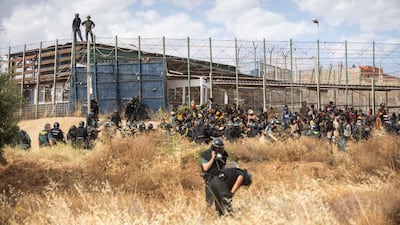EU leaders met on Thursday to discuss ways they could tighten their borders to prevent migrant arrivals.
Some pushed for more fences and walls while others would rather spend the money on improving living conditions in worse-off parts of the world.
National leaders from 27 countries were at the meeting in Brussels to express concern about increasing irregular arrivals, with about 330,000 border crossings recorded last year.
"European countries are experiencing a big increase in the number of people who are coming from outside Europe on an irregular basis," said Irish Prime Minister Leo Varadkar.
"It's important that we, as Europeans, decide who enters our countries, not the human traffickers.
"Those who gain refugee status have the right to remain but others don't, and they should be returned."
Immigration has been a highly sensitive topic in the EU since 2015 when more than a million people, mostly fleeing the war in Syria, crossed the Mediterranean into Europe, and member states fought bitterly over how to provide for them.
Migrants cross from Morocco to Spanish enclave of Melilla - in pictures










Unable to agree, the bloc of 450 million people has turned to tightening its borders to stop people from the Middle East, Africa and Asia arriving, despite criticism that such policy was inhuman and neglected labour market gaps.
From Spain and Greece to Latvia and Poland, there were more than 2,000km of border walls and fences in the EU in 2022, compared to just over 300km in 2014, according to a report by the European Parliament.
But with global mobility restarting since the Covid-19 pandemic, irregular arrivals into the EU rose last year to their highest since 2016, reviving harsher anti-immigration talk.
"We need to 'pull the brake' on illegal migration in the EU," said Austrian Chancellor Karl Nehammer.
"We need the money for it, no matter if you call it a fence or border infrastructure.
"Bulgaria needs help when it comes to border surveillance and personnel, with technical equipment. Every fence is only as good as there is effective surveillance."
The EU's executive, which holds the bloc's shared budget, has long refused to finance border walls, although it does pay for surveillance equipment and other infrastructure.
Luxembourg's Prime Minister, Xavier Bettel, spoke against financing walls, saying Europe's heritage was overcoming divisions after the Second World War and eventually creating a 27-country zone where travellers could cross borders without checks.
Migrant children rescued in French waters - in pictures








"For the moment what is on the table is Bulgaria-Turkey … but this will not be enough, so there will be again new fences and again new walls," Mr Bettel said.
"Is the conclusion that we want a fortress in Europe?"
Belgian Prime Minister Alexander De Croo said the situation amounted to "a major migration crisis", while Dutch premier Mark Rutte was in favour of restricting visas and aid to countries failing to co-operate.
Italy has called for more money for Africa, Hungary wanted more walls and France said the EU should help to fight poverty and terrorism around the world, and combat global warming to see fewer people on the move.
The bloc's top diplomat said "Fortress Europe" was not the answer and that the EU should also offer immigrants some legal ways to get in.
"People move because in their countries there is not a future, there is no peace, there is no stability," said Josep Borrell.
Catholic charity group Caritas said EU leaders should look into improving the bloc's asylum procedures and reception centres to "put human rights and dignity front and centre".



